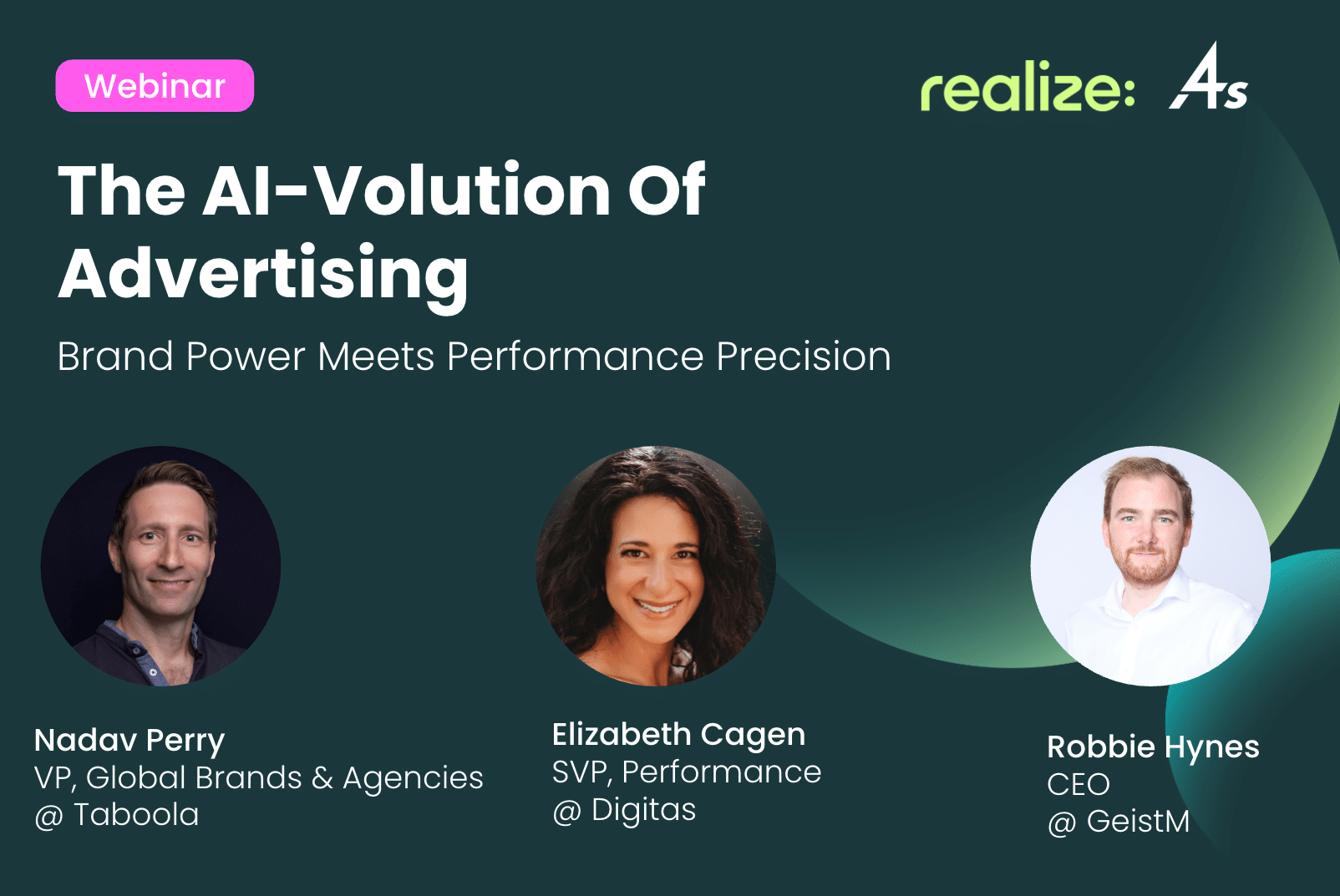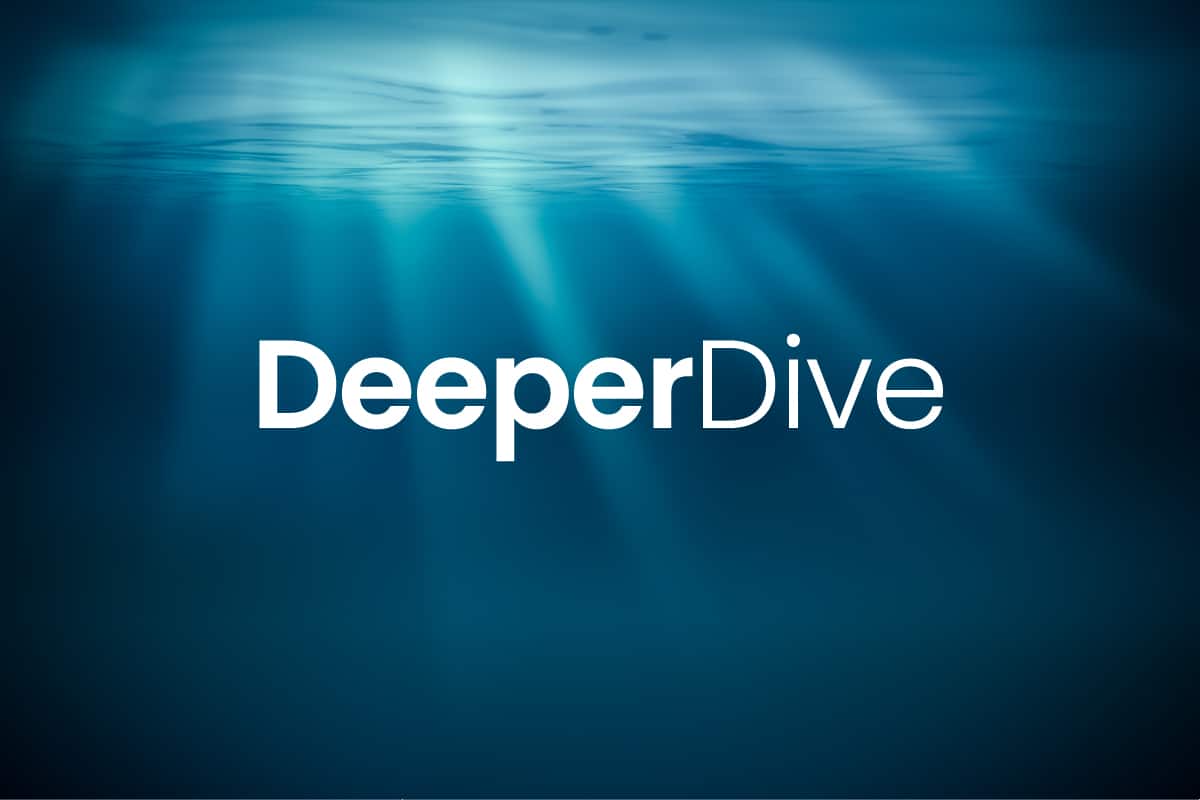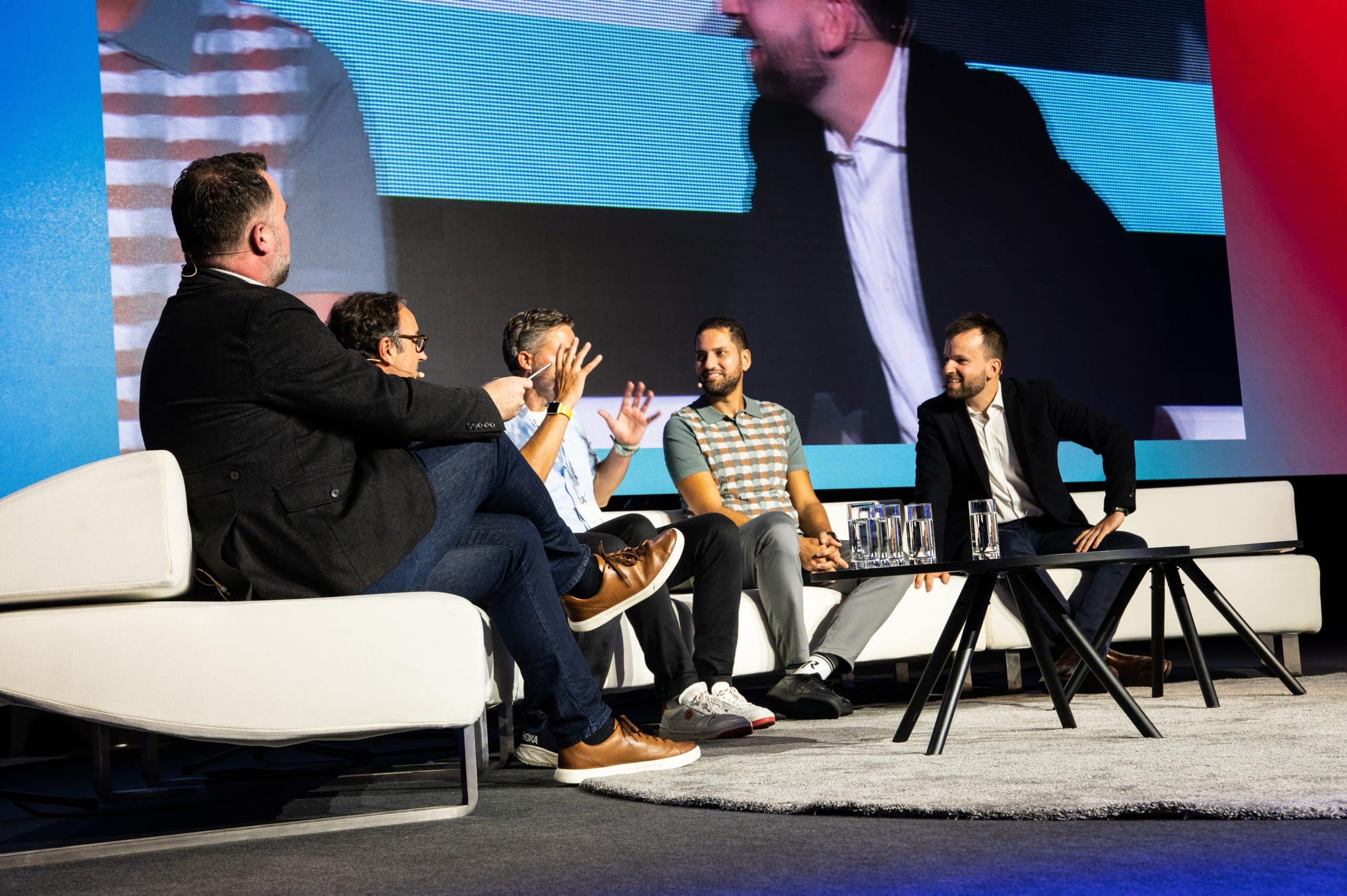Artificial intelligence is transforming advertising, and agencies are on the front lines of that change. Whether it’s streamlining creative production, personalizing brand experiences, or redefining measurement, agencies are learning to adapt to a new era defined by rapid technological development.
That was the focus of The AI-Volution of Advertising: Brand Power Meets Performance Precision, a webinar hosted by 4As and Realize. The session, moderated by Nadav Perry (VP Global Brands & Agencies, Taboola), brought together Elizabeth Cagen, SVP, Performance at Digitas, and Robbie Hynes, CEO of GeistM, for a candid conversation on how their agencies are navigating AI adoption, deploying personalization, and measuring incrementality across their clients’ campaigns.
From Faster To Smarter: Moving Beyond AI For Efficiency
Perry opened the discussion with a telling data point: according to EConsultancy, 75% of marketers say they’re using AI, but most remain in the early stages of applying the technology. Perry described these as “cost-reduction uses”, such as driving efficiency in content creation or video production. Valuable gains, but only a first step.
For small agencies like GeistM, AI has democratized creative tools, giving them access to production capabilities once reserved for large studios. The result is faster output and a levelled playing field – but the differentiator remains human judgement. “Everyone has the same access to ChatGPT,” Hynes said, “but you’re only as good as your prompts.”
For larger agencies like Digitas, the opportunity lies in using AI to transform strategy, not just execution. “AI at its best isn’t just about cost efficiency.” explained Cagen. “The real opportunity is in how we can use AI to create authentic, meaningful connections with consumers at scale.”
Across both agencies, tools like Realize are helping bridge the gap between efficiency and transformation. Realize provides AI-driven insights across the open web, giving agencies visibility into where audiences spend time and which creative combinations drive outcomes. That intelligence is helping agencies to make smarter, data-informed decisions across strategy, targeting and campaign optimization.
Making Marketing Personal: Where AI Meets The Human Touch
The panel agreed that one of AI’s most powerful applications so far has been personalization. According to McKinsey & Company, personalization is no longer optional: 71% of consumers already expect companies to deliver personalized interactions.
Using Realize, Digitas combines contextual intelligence with AI-powered targeting to design campaigns that resonate. “We’re able to use Realize’s Predictive Audience targeting and keyword retargeting to target very high-intent, high-propensity to buy consumers, in the places and spaces where they are, with the kind of content they’re looking for.” said Cagen. This approach has allowed Digitas teams to create meaningful connections with users in moments of genuine receptivity, rather than simply serving impressions.
Hynes emphasized that personalization should never become invasive. “There are bad examples of going too hyper-personalized and creating unease in potential customers,” he warned, “rather than something that’s super beneficial and suits you without making you feel like you’re being tracked.” For example, GeistM uses Realize’s contextual exploration capabilities to identify topics that users who have converted have engaged with, and use these insights to expand their audiences – especially useful in fast-moving verticals where trends shift daily.
When No One Clicks: What The Rise Of Zero-Click Search Means For Brands
The conversation also tackled one of the most disruptive shifts in digital media today: zero-click search. As AI assistants and answer engines collate neat summaries directly on results pages, users increasingly find information without ever visiting its source. For agencies, this trend is forcing reconsideration of how branding and performance efforts coexist.
Cagen described the new buyer journey as a continuum rather than a funnel. “I don’t think it ever was linear,” added Perry, “but it’s just getting messier.” Agencies now need to optimize for visibility in environments beyond search or social.
“We know that people are searching everywhere,” explained Cagen, “so it’s about making sure that your content is optimized across search, social, programmatic, site content, conversations on Reddit. Getting brand mentions out there is what’s going to help you show up in the LLMs.”
While AI-driven discovery may fragment the path to purchase, the open web continues to play a crucial role in turning curiosity into conversion. As users encounter brands across articles, reviews, and recommendations, agencies need to connect those early discovery moments to measurable outcomes. That’s where Realize can help close the loop, using contextual and behavioral signals to re-engage interested users and turn potential consumers into buyers.
Redefining Attribution In The Age Of AI
Attribution remains one of the toughest challenges in digital marketing, and AI is changing both what agencies measure and how.
“With the rise of AI and zero-click searches, we’re having to evolve our thinking about KPIs.” said Cagen, “We’re thinking about things like brand visibility within searches, brand mentions, content creation, and measuring them appropriately.”
Hynes shared that GeistM regularly runs incrementality tests to measure the real value of each channel. Brands that cut upper-funnel investment often see organic and search traffic drop soon after: a signal that awareness and consideration remain critical levers, even as last-click attribution severely underestimates their value.
Perry illustrated the difficulty of determining the appropriate KPIs and measurement windows with an example from a gaming client. The brand had tested Realize, and initially found it to be too expensive when measuring Cost Per Install (CPI) with a seven-day lookback window. But when they changed their KPI to first 30-day cash deposits, Realize emerged as the top-performing source by user quality. “That’s why it’s so important to take the time to help our clients understand what it is they really care about, and how to measure it,” he concluded.
Winning The Fight Against Diminishing Returns
The final topic discussed was a shared challenge faced by nearly every online advertiser: diminishing returns. Realize’s research with Qualtrics found that nearly 80% of advertisers hit diminishing returns before spending 70% of their budgets across online platforms. For agencies, understanding where spend is truly having incremental impact is critical.
At Digitas, Cagen’s teams combine forecasting and incrementality testing to ensure that every dollar drives measurable growth. “We take in multiple data sources from online, offline, media, expectations about the competition and promos that are going to market, to create a more accurate picture of our expected outcomes.” she revealed. “Once the media is live, we’re constantly monitoring it, optimizing it, and conducting incrementality testing to make sure that we’re actually driving incremental revenue. Realize gives us the opportunity to understand incrementality and the value that our media is helping drive for us.”
Hynes emphasized the importance of diversification, both across channels and creative variations. GeistM uses Realize’s predictive analytics to identify expanded audiences, combined with its AI tools to generate dozens of creative variations of top performing ads, keeping campaigns fresh and effective.
Adapting To The AI Era
Agencies are in a period of rapid reinvention. AI is reshaping how campaigns are built, measured, and optimized, and best practices are changing daily.
For agencies like Digitas and GeistM, the challenge isn’t just adopting a new technology: it’s adapting strategies, processes, and client models to make the most of it. That means evolving team structures, measurement frameworks, and creative workflows to align with how audiences discover and engage with brands.
As Perry observed, the best use of AI isn’t just to increase efficiency, but to power transformative change. With Realize, agencies can translate this technological shift into tangible outcomes: identifying where to invest, how to prove value, and how to build more resilient, data-informed strategies for their clients.
The agencies that thrive in the AI era won’t just use the new tools; they’ll reshape how they think, plan, and measure success around them.
If you’d like to hear the full conversation, you can watch the full webinar on demand here.



